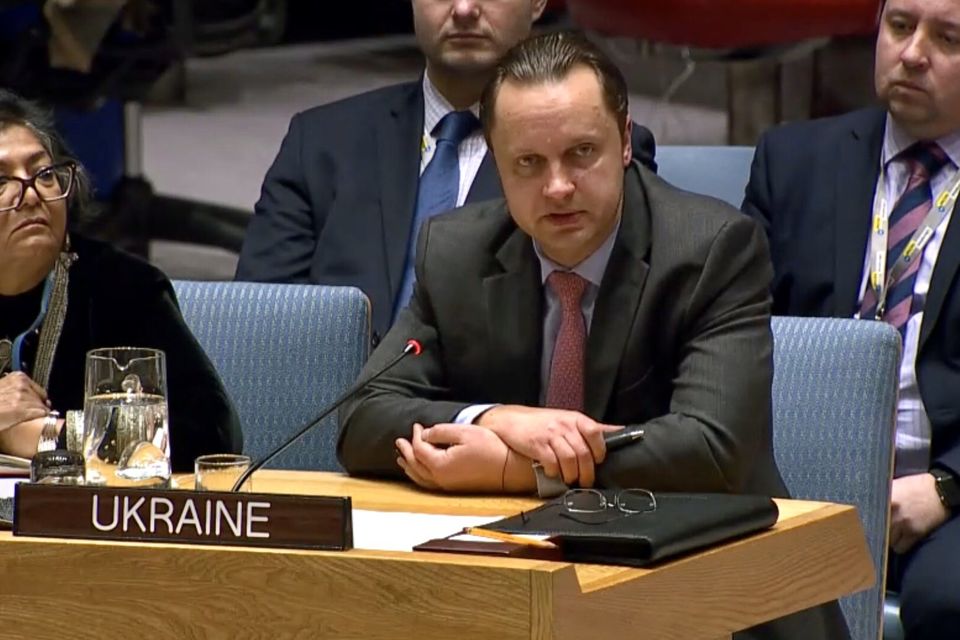Виступ делегації України на відкритих дебатах міністерського рівня РБ ООН щодо перехідного правосуддя

Mr. President,
We appreciate your timely initiative to discuss this important subject — transitional justice and ways to reinforce links between all its components within the United Nations framework for strengthening the rule of law.
Before going into the substance, I would like to put on record that my delegation aligns itself with the statement delivered on behalf of the European Union.
At the outset, let me recall the widely recognized notion that transitional justice is composed of different sorts of regulations, including retributive justice, restorative justice, reparatory justice, administrative justice and constitutional justice, all of which shall be understood as complementary to each other.
We share this vision as well as agree with the conclusion about lack of coherence and comprehensive approach to the holistic implementation of all components of transitional justice, as rightly mentioned in the concept note.
Still, there is no doubt that transitional justice is an important tool, which, from its inception, continues to develop not only in the legal perspective, but also associates today with complex processes involving non-judicial instruments and mechanisms of restoring peace in post-conflict circumstances.
Mr. President,
The subject of transitional justice gained special importance for my country amid the ongoing foreign aggression — almost 6 years of unprecedented for the postwar Europe violations of the basic norms and principles of international war and order, the occupation of the Autonomous Republic of Crimea and the city of Sevastopol and certain parts of Donetsk and Lugansk regions of Ukraine.
Taking into account the limited time for intervention, I will not repeat Ukraine’s actions at judicial avenues to achieve justice in the international courts and tribunals, including the International Criminal Court, and to bring to account those responsible for numerous war crimes and human rights violations in the temporarily occupied territories of Ukraine. I will also not deliberate in details on the Ukrainian proposal from dating back to 2015 to deploy peacekeeping operation under the United Nations auspices, with strong transitional justice component in its mandate.
Instead, I will focus on the practical realization of transitional justice by Ukrainian authorities. Before doing so, it is important to refer to the 2010 Guidance Note of the Secretary-General “United Nations Approach to Transitional Justice” and touch upon the normative boundaries of the United Nations in accordance with international standards. Notably that, the UN cannot endorse provisions in peace agreements that include amnesties for genocide, war crimes, crimes against humanity, and gross violations of human rights.
In 2019 the Commission on Legal Reform was established in Ukraine by a Presidential Decree. The Commission acts as a consultative and advisory organ for the Head of State. This body includes a Working Group on reintegration of temporary occupied territories, which is tasked with the following: drafting the national transitional justice model for Ukraine (for both Crimea and Donbas), amending the so-called “discriminatory” provisions in the Ukrainian legislation regarding residents of temporary occupied territories, and drafting the de-occupation and reintegration strategy for Crimea and Donbas.
At present, the Working Group jointly with human rights NGOs and international experts developed the draft Concept of a state policy for the protection of human rights in the context of overcoming consequences of international armed conflict on the territory of Ukraine.
The Concept is a framework document and represents an embodiment of the concept of transitional justice for Ukraine. It sets out, in particular, the purpose and objectives of state policy, its international legal basis, and ensures the participation of civil society organizations in the implementation of the policy.
The pillars of the concept of transitional justice are relate to the access to justice and fair treatment, redress for victims of armed conflict, restoration of violated rights, ensuring the right to truth, prosecution of perpetrators of serious crimes, measures on non-repetition.
Mr. President,
Almost in all cases of recent conflicts, the justice had become transitional. Despite the absence of a universal solution that would fit all scenarios, the establishment of truth, justice, reparation, and guarantees of non-recurrence are among the preconditions for sustainable peace after wars, conflicts and occupations. The ongoing Russian-Ukrainian conflict is not an exception here.
We hope that in the nearest future the efforts of Ukraine — supported by the international community and aimed at peaceful settlement of the conflict and de-occupation of Ukrainian territories — will serve as historic example, including in the field of effective implementation of transitional justice during ongoing conflict, as well as post-war reintegration, reconstruction and reconciliation.
Thank you.
